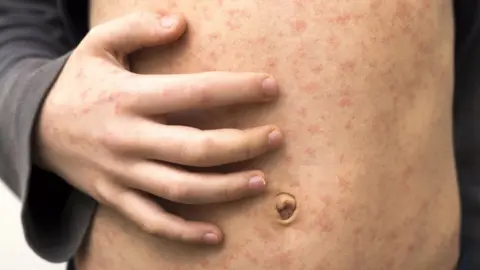Watch for measles, UK doctors told, as vaccine rate dips
 Getty Images
Getty ImagesDoctors must be on high alert for measles as vaccine rates among young children have dipped to a 10-year low, leaving some unprotected and risking outbreaks of the highly infectious and dangerous virus, experts say.
It is the first time in decades the Royal College of Paediatrics and Child Health (RCPCH) has issued national guidance such as this.
At least 95% of children should be double vaccinated by the age of five.
But the UK is well below that target.
Latest figures show only 84.5% had received a second shot of the protective measles, mumps and rubella (MMR) jab - the lowest level since 2010-11.
Measles can make children very sick. The main symptoms are a fever and a rash but it can cause serious complications including meningitis. For some, it is fatal.

What is measles?
- Measles is a highly contagious virus that spreads very easily
- Just 15 minutes in direct contact with someone infected is enough to catch it
- People whose immunity is compromised, pregnant women and unvaccinated children are at increased risk of severe disease

The RCPCH is worried the UK is now seeing a "devastating resurgence" of virtually eliminated life-threatening diseases such as measles, because of low vaccine uptake.
Between 1 January and 30 September, there were 149 laboratory-confirmed measles cases in England - compared with 54 in the whole of 2022.
Many were in London, Wales and Leicester.
RCPCH president Dr Camilla Kingdon, said: "Having to consider measles in our national guidance for the first time in decades is a disappointing but necessary move.
"Many paediatricians I know live in fear of potential measles outbreaks this winter."
The RCPCH is urging doctors to use "every opportunity" to check a child's vaccination status and offer the MMR jab to those who have not had two doses.
Parents are advised:
- If your child has not had a first or second dose, or you are just not sure what they have and have not had, contact your GP surgery
- You can also check your child's personal child health record - known as the red book.
- It is never too late for your child to have these critical vaccinations and your health practitioner will be happy to discuss any questions or concerns you might have
The RCPCH is also calling for the government to publish its "overdue" national vaccination strategy and focus attention on ensuring equal access to immunisations across all regions and socio-economic groups.
Dr Kingdon said: "Of course, vaccine hesitancy is an issue but there are real problems with accessibility that are also at play. We know that there are significant inequalities in vaccine uptake by ethnicity, deprivation and geography. This has to be addressed."
